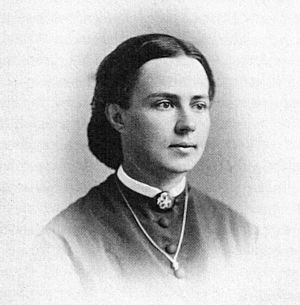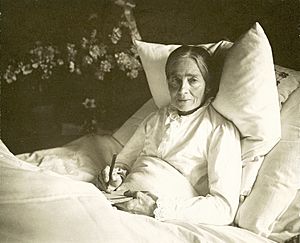Marie Heim-Vögtlin facts for kids
Marie Heim-Vögtlin (born October 7, 1845, in Bözen – died November 7, 1916, in Zürich) was a very important person in Switzerland. She was the first female Swiss doctor. She was also a writer and helped start Switzerland's first hospital especially for women giving birth.
Becoming a Doctor
Marie Vögtlin grew up in Bözen, where her father was a pastor. She received a special education at home and in cities like Zürich.
In 1867, something happened that changed her life. Her fiancé, who was studying to be a doctor, ended their engagement. He married Nadezhda Suslova instead, who was the first female doctor in Europe. This made Marie decide to study medicine herself. Her father wasn't very happy about it at first, but he eventually supported her.
She applied to the University of Zürich. This university was special because it was the first medical school in Europe to let women study there. Marie's decision caused a big stir in Switzerland. Before her, only a few "bold" foreign women, like Suslova, had been allowed to study medicine.
At the university, Marie and the few other women students got a lot of help from their teachers. Even though many people thought it was wrong for women to study medicine, Marie did very well. She passed her exams with high marks.
After university, she went to Leipzig to learn more about women's health. She also worked in a hospital in Dresden where babies were born. On July 11, 1874, she earned her doctorate (a high degree) in Zürich. She wrote a special paper called a dissertation. To get official permission to work as a doctor in Zürich, her father had to step in and help her.
Her Work and Family
When Marie Heim-Vögtlin first started her medical practice, she didn't have many patients. But soon, she became known as a very skilled and kind doctor. People especially admired her for being so generous to women who were poor.
In 1875, she married Albert Heim, who was a famous geologist. Back then, it was the law that a husband had to give permission for his wife to keep working after they got married. Albert agreed that Marie could continue her important work.
Marie and Albert had two children, a son named Arnold and a daughter named Helene. They also took care of a foster child. Marie Heim-Vögtlin passed away in 1916 from a lung illness.
Helping Her Community
Marie Heim-Vögtlin was a big part of starting the Schweizerische Pflegerinnenschule mit Spital. This was Switzerland's very first hospital focused on women's health. It also had a special area for mothers to give birth and a school for nurses. When the school opened in 1901, Marie helped manage its money as the bursar.
She was also very active in movements that wanted to make society better. She supported women's suffrage, which meant women getting the right to vote. She also joined the temperance movement, which worked to reduce alcohol use. Marie also wrote several books and articles, mostly for women and children.
How She Is Remembered
Marie Heim-Vögtlin has been honored in many ways:
- The Swiss National Science Foundation (SNSF) has a special scholarship for women named after her.
- In 1995, a street near the women's hospital in Zürich was named after her.
- In 2010, her work was recognized by the Gesellschaft zu Fraumünster, a special society.
- In 2016, to mark 100 years since her death, the Swiss Post released a stamp in her honor.
See also
 In Spanish: Marie Heim-Vögtlin para niños
In Spanish: Marie Heim-Vögtlin para niños



